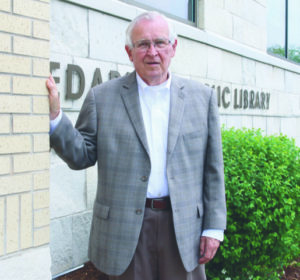When Bill Wernecke Sr. was 14 in 1946, a double-feature at the Rivoli Theatre cost 14 cents and, more notably at the time, his parents bought a small business called Cedarburg Lumber, which was “way out in the middle of nowhere.” (His family lived in Whitefish Bay.)
“My father was a great salesman in the coal industry and a very hard worker,” says Wernecke, 87. He is this year’s recipient of the Greater Cedarburg Foundation’s Annual Civic Award. “Dad originally wanted to buy a hardware store, but when the opportunity arose to grow a small lumberyard when Americans were starting to rebuild after World War II – and the market for building materials was exploding – he didn’t hesitate.”
They sold their house, moved their family of five into a three-bedroom apartment in Cedarburg, and dove in full throttle.
“I was fascinated with everything, especially the machinery,” Bill explains, noting that his mother cooked most meals in the business’ model kitchen, and they sometimes dined at the Coffee Pot or Barth’s “On the Bridge,” the only two restaurants in town. “None of us knew anything about the business, but it was a matter of survival and we were ready to learn.”
Bill’s parents, both college graduates and former teachers, valued education highly and this proved a driving force in the Wernecke family for generations to follow. Bill embraced this ideal, graduating from Cedarburg High School as class valedictorian in 1950 while working summers in the family business. He went on to earn a business degree four years later at Northwestern University, where he met his wife, Sue, who was a student in the Medill School of Journalism there.
After both graduated in spring of 1954, they married and moved to the apartment above what is now the Java House on Washington Avenue. Bill’s father promptly told him, “Your mother and I haven’t had a vacation in the four years since you’ve been in college. We are leaving shortly for six weeks in Europe, and you will be completely in charge.”
Once again, Bill dove in.
“Boy, did I learn fast,” says Bill, laughing. “It was tremendously challenging, but interesting and exciting. I was young and fascinated. Dad was wonderful – a tough taskmaster but also a good teacher. It was pure joy to help people build their dream homes…very tangible and rewarding, and I was motivated.”
He continues, “Dad’s attitude was this: you could never do enough. He wanted us to keep learning all our lives.”
When Bill eventually took the helm at Cedarburg Lumber in the late 1960s, he forged forward and, with a thriving business that involved all three of their children – Bill Jr., Clark, and Trish – the couple started giving back to the community they felt privileged to call home.
“Cedarburg is a very special place,” he says. “To live here, raise a family with the security and close-knit atmosphere, we felt it was the right thing to start giving back to the community that gave us so much. My parents always did – they taught by example.
Bill joined the Cedarburg Lions Club, becoming president in 1961, and went on to lead the Cedarburg-Grafton Rotary Club as a charter member in 1964 (he, along with Don Levy, are the only surviving founders). He is most proud of all the scholarships the Rotarians give: “When you see the families of these kids, the pride in their faces when they watch their child receive funds to advance their education, it’s the best feeling.”
Eventually, Bill became President of CESSA 19 School Committee, a Wisconsin organization that worked to develop and evolve school district borders. He also served on the board of St. Boniface Church in Mequon, and helped rebuild the memory garden at St. Christopher’s in River Hills.
The giving continued: Cedarburg Lumber brought the Cedarburg Fire Department’s Survive Alive House to life locally, teaching grade schoolers the importance of having a plan to get out of a burning house. The company also provided the community with a special gathering place in the Centennial Park Gazebo, and donated countless supplies to local Eagle Scout projects through the years. Further, working with the Cedarburg Landmark Preservation Society, the lumberyard helped provide new windows and a new roof to help restore a local architectural treasure – the Cedarburg Mill – to its former glory.
Decades later, Bill joined forces in raising funds for the Cedarburg Public Library’s interior furnishings; in six months’ time, this community raised $700,000 to get the job done. What’s more, Bill prioritized joining the founding team that launched the Greater Cedarburg Foundation, a community trust that grants funds to local nonprofit organizations to preserve the local cultural heritage, enhance artistic endeavors, and support educational, social and community-based services in the Greater Cedarburg area.
During those decades, Sue was busy applying her journalism expertise, along with her gifts as a business-minded, philanthropic organizer. Sue is a lifetime Girl Scout, leading her own troop and becoming president of the Southeastern Wisconsin Girl Scouts Manitou Council. In addition, Sue took on the leadership role in Southeastern Wisconsin’s AFS international high school exchange program.
While helping young people was a primary focus in this couple’s philanthropic efforts, Bill continued his commitment to growing Cedarburg Lumber from a team of 10 to more than 180 employees when they sold the business 59 years later in 2005. Bill Jr. joined the company officially after earning an MBA at Northwestern in 1979. Clark went on to become an archaeologist in Austin, Texas, and Trish is a multi-faceted church employee locally.
Cedarburg Lumber became an employee-owned company, so everyone had a stake and an incentive to work hard and value the business as owner-employees who all received benefits of the company’s success.
“One of the biggest rewards was watching the people who worked side-by-side with us grow, mature, and enjoy what they did – it was a very special community of people who worked for the company 20, 30, 40-plus years,” he says.
It was a wonderful crew, Bill says, who continues to see these “old friends” to this day: “We were all in it together, and it was amazing.”
“It really all comes down to this – I like to help people, and I like to get things done,” he concludes. “I feel good when I’m involved. To be involved with my family, doing things we all believe in, really creates an interesting, fulfilling life.”
Bill Wernecke Sr. would have been honored officially at the 18th Annual Cedarburg Civic Celebration this spring, along with recent 2020 grant recipients, joining the founders and friends of The Greater Cedarburg Foundation in celebration of his 2020 GCF Annual Civic Award. In the interest of health and safety due to Covid-19, this event was cancelled. Sadly, Sue Wernicke passed away this spring a few weeks after this interview. Our deep condolences to the Wernicke family.





